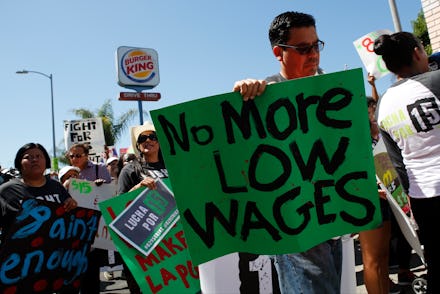Take a Wild Guess What the IMF Just Told the U.S. to Do to Grow Our Economy

The news: While Congress may not believe that minimum wage is even worth debating, America's low pay floor is now earning criticism from one of the biggest banks in the world: the International Monetary Fund (IMF).
On Monday, the IMF issued its annual review of the American economy. Not only did the bank downgrade the U.S. GDP growth forecast to 2% this year (it's usually over 3%), it also included a long list of recommendations to boost the economy — and for the first time, the list included raising the minimum wage.
"[G]iven its current low level (compared both to U.S. history and international standards), the minimum wage should be increased," the IMF wrote. "This would help raise incomes for millions of working poor and ... ensure a meaningful increase in after-tax earnings for the nation's poorest households."
The case for raising the pay floor: The IMF declined to specify exactly what America's minimum wage should be, but plenty of economic data suggests that even President Barack Obama's call for $10.10 per hour pay is not enough. Adjusted for inflation, Americans should be getting paid at least $10.86 per hour by 1968 standards. And if you factor in productivity, minimum wage should have reached $21.72 per hour by 2012, according to the Center for Economic and Policy Research.
Image Credit: CNN
And if nationwide minimum wage increased to $10.10 per hour, around 21.3 million employees would receive pay increases — if they keep their jobs, that is. All in all, about 11% of the American workforce would get a raise.
Image Credit: The Economic Policy Institute
That's especially good news for Millennials and teenagers, who make up the majority of minimum wage earners. But it would also be a big boost for older people with families:
Image Credit: Pew Research
The case against raising the pay floor: There's a strong and obvious ideological divide in this debate. Congressional Republicans have made it clear that they won't consider voting on a minimum wage increase, even though Republicans nationwide have a more amenable view.
Image Credit: Pew Research
Leaving aside the political aspect, there are economic concerns as well. Some worry that a minimum wage increase will burden businesses and kill jobs, especially for unskilled workers. Last year a survey of 38 economists by the University of Chicago's Booth School of Business found that opinions were still fairly evenly split.
What will happen next? Despite overwhelming public support for raising the minimum wage, the ongoing congressional quagmire suggests that we shouldn't expect any nationwide measures in the foreseeable future. It'll be more likely to see unilateral moves by Obama such as the recent salary raise for federal workers or state-by-state action.
On the heels of Seattle implementing a $15 an hour minimum wage — effectively the highest in the world — San Francisco is planning on doing the same. As more states raise their pay floors to $10.10 and above, these localized approaches seem like the way to go.
Image Credit: CNN